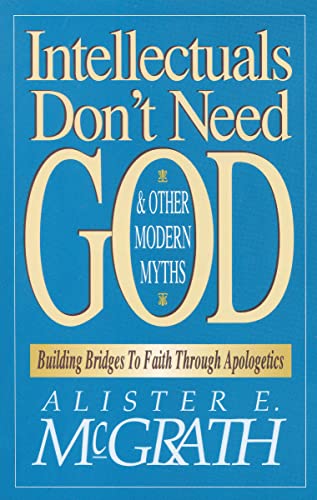Items related to Intellectuals Don't Need God and Other Modern Myths

Intellectuals Don't Need God is for people who are not convinced by the arguments of classical, rationalistic apologetics, for people who feel that Christianity must have a broader appeal that to reason alone if it is to be persuasive to non-Christians. Alister McGrath shows convincingly that reason is only one of many possible points of contact between the non-Christian and the gospel. In today's world, nonrational concerns -- such as a sense that life lacks focus, an unconscious fear of death, a deep sense of longing for something unknown we don’t have but know we need -- are much more effective points of contact for apologetics. In this book, Dr. McGrath (who is both a theologian and a scientist with a Ph.D. in microbiology) combines the clarity of a brilliant scientific mind with a deep commitment to Christ and to reaching non-Christians. Intellectuals Don't Need God is for anyone who has questions about the validity of Christianity as well as for students, pastors, and lay leaders. Anyone who works with students and young people especially needs to read this book. As McGrath says, "apologetics is not about winning arguments -- it is about bringing people to Christ."
"synopsis" may belong to another edition of this title.
Alister E. McGrath is a historian, biochemist, and Christian theologian born in Belfast, Northern Ireland. McGrath, a longtime professor at Oxford University, now holds the Chair in theology, ministry, and education at the University of London. He is the author of several books on theology and history, including Christianity’s Dangerous Idea; In the Beginning, and The Twilight of Atheism. He lives in Oxford, England and lectures regularly in the United States.
"About this title" may belong to another edition of this title.
- PublisherZondervan Academic
- Publication date1993
- ISBN 10 0310590914
- ISBN 13 9780310590910
- BindingPaperback
- Number of pages242
- Rating
Buy New
Learn more about this copy
Shipping:
US$ 3.99
Within U.S.A.
Top Search Results from the AbeBooks Marketplace
Intellectuals Don't Need God and Other Modern Myths Format: Paperback
Book Description Condition: New. Brand New. Seller Inventory # 9780310590910
Intellectuals Don't Need God and Other Modern Myths
Book Description Paperback. Condition: New. New and unread. Buy multiples from our store to save on shipping. Seller Inventory # 1804250171
Intellectuals Don't Need God and Other Modern Myths
Book Description Condition: New. Book is in NEW condition. 0.5. Seller Inventory # 0310590914-2-1
Intellectuals Don't Need God and Other Modern Myths
Book Description Condition: New. New! This book is in the same immaculate condition as when it was published 0.5. Seller Inventory # 353-0310590914-new
Intellectuals Don't Need God and Other Modern Myths: Building Bridges to Faith Through Apologetics (Paperback or Softback)
Book Description Paperback or Softback. Condition: New. Intellectuals Don't Need God and Other Modern Myths: Building Bridges to Faith Through Apologetics 0.65. Book. Seller Inventory # BBS-9780310590910
Intellectuals Don't Need God and Other Modern Myths
Book Description Paper Back. Condition: New. Seller Inventory # 12043
Intellectuals Don't Need God and Other Modern Myths
Book Description Condition: New. Seller Inventory # ABLIING23Feb2215580104761
Intellectuals Don't Need God and Other Modern Myths
Book Description Paperback. Condition: new. New. Fast Shipping and good customer service. Seller Inventory # Holz_New_0310590914
Intellectuals Don't Need God and Other Modern Myths
Book Description Condition: New. Seller Inventory # I-9780310590910
Intellectuals Don't Need God and Other Modern Myths
Book Description Paperback. Condition: new. Buy for Great customer experience. Seller Inventory # GoldenDragon0310590914

